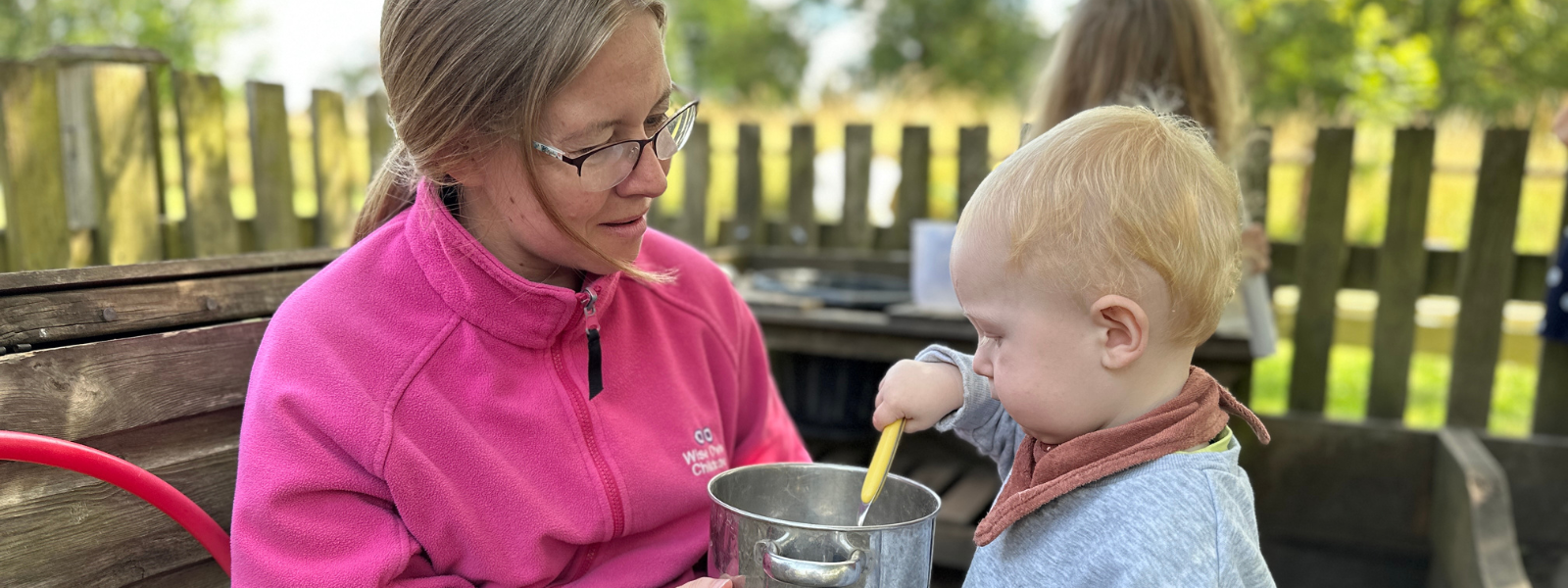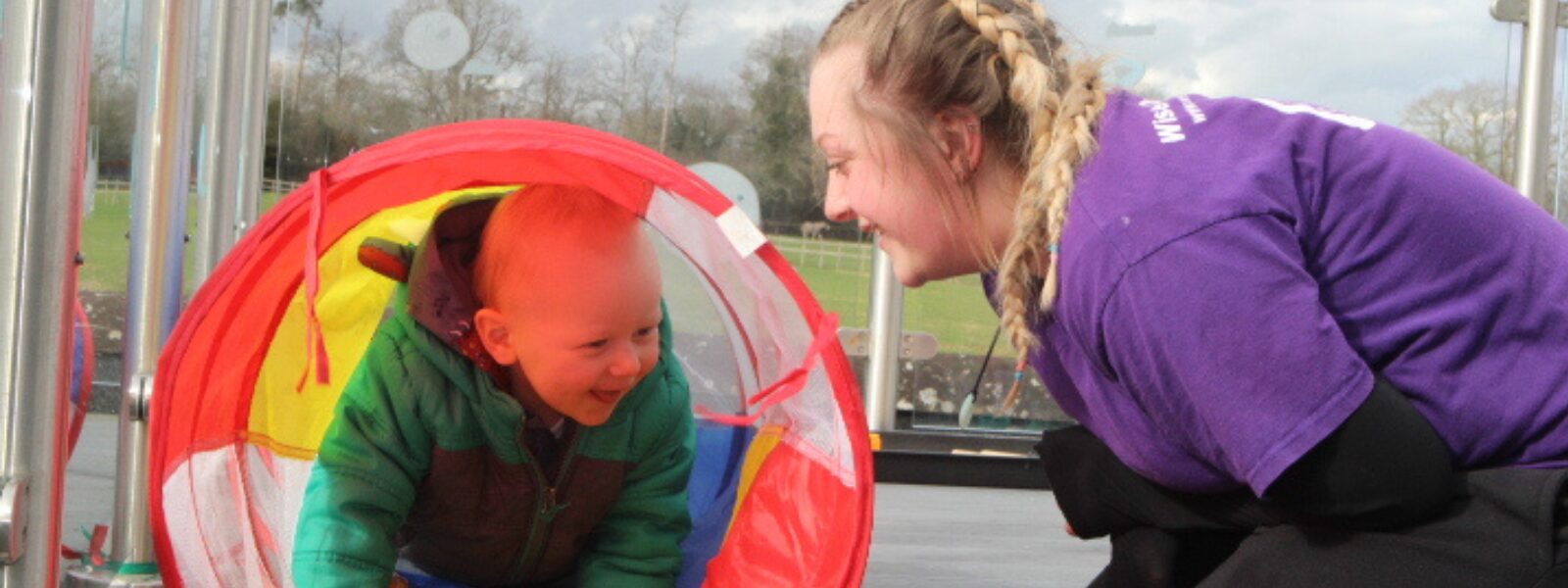Settling in Sessions
We offer three free settling-in sessions before your child starts with us. These settling in sessions must be held before the start date stated on your child’s booking confirmation. This includes a 1-hour session with the parent present, and two 2-hour stay & play sessions without the parent present. If further settling in sessions are required, we may be able to accommodate this for an additional fee. Settling in sessions are a great way for children and parents to familiarise themselves with the nursery and to get to know the child’s key worker. If your settling in sessions haven’t been arranged one month before your child’s start date, please contact your nursery team to book these in.
Please read the information below to prepare for your settling in sessions.
Your Baby’s Response to Nursery
Starting nursery is a big step for children, and it’s natural for them to feel a little unsettled in a new environment. During this transition, your child may cry, cling to you, or show signs of discomfort during the sessions. These emotional responses are completely normal and a natural part of adjusting to change.
Our caring and experienced staff are here to support both you and your baby during this time. We understand the importance of creating a warm, welcoming environment where your child feels safe and secure. With patience and gentle encouragement, your baby will begin to explore their surroundings, build trust, and form special bonds with our team.
In time, these bonds will help your child feel confident and happy at nursery, turning it into a place they look forward to attending. Remember, every child adjusts at their own pace, and we are here to guide and support every step of the way.
Emotional response of other children during your visit
Visitors, including parents attending settling-in sessions, can occasionally trigger emotional reactions in other children. This is a natural part of the nursery environment and nothing to be concerned about. You may notice that our team doesn’t always intervene immediately when these reactions occur. This is because our experienced staff understand when a child might benefit from having space to self-soothe and develop their own coping skills.
Separation anxiety is common, especially in our baby room. If a child has already formed a bond with a particular staff member and that person steps out of the room, the child may show signs of distress. Our team is experienced in dealing with separation anxiety and will sooth and support children appropriately through these moments. At times, this may include allowing the child some space to settle themselves when needed.
Activity Levels Will Vary
Depending on the time of day, you might see quiet, focused activities taking place in the room or more active ‘free’ play. For example, mornings might include creative or sensory activities like painting, sand or water play, while afternoons could involve story time or free play.
The child’s needs are central to our routine, and their feeding, sleeping, and care schedules can influence what’s happening during your visit.
Staff Decisions Are Thoughtful
- If a Baby Is Crying: Occasionally, a child may be left to cry for a little longer than you might feel comfortable with. This is often a considered choice to help the child learn self-soothing skills, this is not neglect. This approach will also be something that is discussed with the child’s parents.
- Unusual Snack Times: You might see children enjoying a snack at what seems like an unusual time. This might be part of a social or communication activity, such as encouraging patience, turn-taking, or practicing chewing skills.
Rest assured that every action by our team has a purpose and is tailored to support the child’s developmental needs.
Professional and Organised Team
Our nursery team is highly trained to balance structure with flexibility. Even in moments that seem chaotic (like soothing multiple upset babies), we’re working with care and professionalism, in a 1:3 ratio, to ensure every child feels safe and supported.
If you have questions about anything you observe, we’re happy to explain the reasoning behind our approaches. If you see anything during your settling in session that you are not comfortable with, please speak with the room manager or nursery manager during your visit or drop the nursery an email after your visit.
Tips for a Successful Settling in Session
- Stay Calm and Reassuring: As you will know by now, children pick up on your emotions. Remaining calm can help them feel more secure.
- Prepare for Ups and Downs: Your child’s behaviour may vary from session to session as they adapt to the new environment.
- Trust the Process: It’s normal to feel concerned if your child cries or struggles with separation, but know that this is a natural part of their adjustment. It is also quite common to see other children upset, especially in the baby room. Your presence alone may trigger an emotional response in another child. Our staff are trained to expect this and deal with it appropriately.
- Communicate with Staff: Share any specific concerns or routines that can help ease your child’s transition.
After the Session
Take time to reflect on your experience. It’s common for it to take a few weeks before your child fully adjusts to nursery life. Remember, our team is here to support you and your child through every step of the journey.
If you have any questions or need further reassurance, don’t hesitate to ask. Together, we’ll help your little one feel at home in their new nursery environment.
My child seems different at home and is always tired
It’s common for children to seem different or more tired than usual at home during their early weeks of starting nursery, and this is completely normal. Adjusting to a new environment can be both exciting and exhausting for young children as they take in so many new experiences.
At nursery, children are exposed to new sights, sounds, routines, and interactions with peers and staff. This stimulation helps them grow and learn, but it also requires a lot of energy and focus. For many children, navigating these changes can leave them feeling more tired or emotionally sensitive when they return home. They are processing new routines, forming relationships, and managing the natural ups and downs of their day—all of which can be tiring, even if they are having fun.
Additionally, young children may initially feel more emotionally vulnerable during this transition, as they work to understand and adapt to being away from their primary caregivers for longer periods. This can lead to them seeking extra comfort, attention, or reassurance at home.
As your child becomes more familiar with nursery life, you’ll likely notice them becoming more settled and comfortable with the routine. Their energy levels and behaviour at home should balance out as they adapt to this new stage in their development. In the meantime, providing plenty of rest, extra cuddles, and understanding at home can help them adjust more smoothly.
My Child is Having Trouble Saying Goodbye
Separation anxiety is a natural phase of development that many children experience, often peaking between six months and three years of age. While it can be heart-wrenching to leave your little one in tears, rest assured that this is a common and normal part of growing up, and most children gradually outgrow it. Here are some tips to make the transition to nursery smoother for both you and your child:
Prepare in Advance
Being organised can help reduce stress for both you and your child. Allow plenty of time to get ready and leave for nursery without rushing.
- Pack Together: If your child is old enough, involve them in packing their bag. This gives them a sense of control and excitement about the day ahead.
- Build Understanding: Read books and stories about going to nursery. This helps your child visualise the experience and provides an opportunity to ask questions and express concerns.
Establish a Predictable Routine
Children feel more secure when they can predict what will happen next. Establishing a consistent routine for leaving the house and arriving at nursery can provide them with this sense of stability.
- Morning Routine: Develop a sequence of steps—breakfast, brushing teeth, packing their bag, and heading out—that stays the same each day.
- Travel Familiarity: Play the same music, sing songs, or talk about familiar landmarks on the journey. This can make the trip to nursery comforting and predictable.
- Arrival Ritual: Follow a set sequence upon arrival, such as hanging up their coat, finding a favourite toy, or greeting their key worker.
Create a Good-Bye Ritual
A consistent, simple good-bye ritual can help reassure your child that you’ll return.
- Keep it Short and Sweet: Give a hug, a kiss, or a special handshake, and then leave confidently. Lingering or coming back can increase anxiety.
- Be Consistent: Perform the same ritual every day to help your child feel secure.
Communicate with Staff
If your child is upset during drop-off, communicate with their key worker about how to best comfort them. Share tips, such as bringing a favourite toy or item from home, to ease the transition.
- Trust the Nursery team: Remember, we are professionals and have experience comforting children and helping them adjust.
Stay Calm and Reassuring
You set the tone for how your child feels about separation.
- Be a Role Model: Try to remain calm and confident during drop-off, even if you’re feeling emotional inside. Your demeanour reassures your child that everything is okay.
- Avoid Guilt: Feeling guilty is normal, but try not to let it show. Instead, focus on the positives of their day, like playing with friends or learning new things.
Avoid Revisiting Difficult Goodbyes
After a tough drop-off, resist the urge to rehash the experience with your child. Instead, focus on their day’s highlights when you pick them up.
- Celebrate Success: Praise your child for their bravery and talk about fun moments from their day to help build positive associations with nursery.
Remember, They Will Settle
While goodbyes can be tough, children usually settle in quickly once you’ve left. Trust that they are in capable hands, and remind yourself that this phase will pass. Over time, your child will gain confidence and look forward to their time at nursery.
Separation anxiety is a challenge, but with patience, preparation, and consistency, you and your child can navigate this stage successfully. By creating a predictable routine and staying calm and supportive, you’re helping them build the resilience and confidence they’ll carry throughout their lives.


